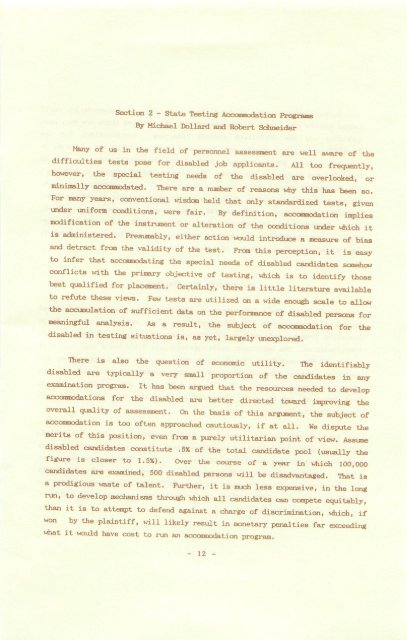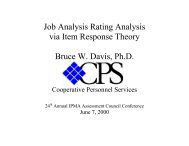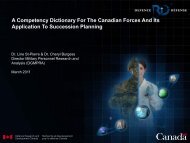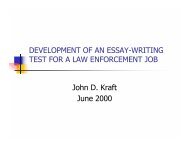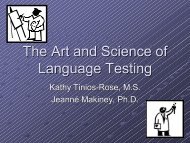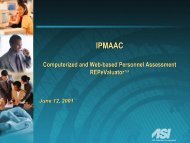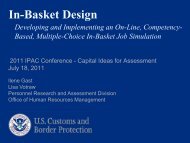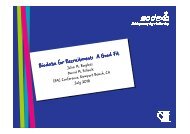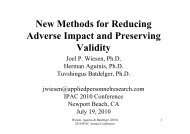Employment Testing of Persons with Diasabling Conditions - IPAC
Employment Testing of Persons with Diasabling Conditions - IPAC
Employment Testing of Persons with Diasabling Conditions - IPAC
You also want an ePaper? Increase the reach of your titles
YUMPU automatically turns print PDFs into web optimized ePapers that Google loves.
Section 2 - State <strong>Testing</strong> Acccmnodaticn Program<br />
By Michael Dollard and Robert Schneider<br />
Many <strong>of</strong> us in the field <strong>of</strong> personnel assessment are well aware <strong>of</strong> the<br />
difficulties tests pose for disabled job applicants. All too frequently,<br />
however, the special testing needs <strong>of</strong> the disabled are overlooked, or<br />
minijDally accommodated. There are a number <strong>of</strong> reasons why this has been so.<br />
For many years, conventional wisdom held that only standardized tests, given<br />
under uniform conditions, were fair. By definition, accommodation implies<br />
modification <strong>of</strong> the instrument or alteration <strong>of</strong> the conditions under which it<br />
is administered. Presumably, either action would introduce a measure <strong>of</strong> bias<br />
and detract from the validity <strong>of</strong> the test. From this perception, it is easy<br />
to infer that accommodating the special needs <strong>of</strong> disabled candidates somehow<br />
conflicts <strong>with</strong> the primary objective <strong>of</strong> testing, which is to identify those<br />
best qualified for placement. Certainly, there is little literature available<br />
to refute these views. Few tests are utilized on a wide enough scale to allow<br />
the accumulation <strong>of</strong> sufficient data on the performance <strong>of</strong> disabled persons for<br />
meaningful analysis. As a result, the subject <strong>of</strong> accommodation for the<br />
disabled in testing situations is, as yet, largely unexplored.<br />
There is also the question <strong>of</strong> economic utility. The identifiably<br />
disabled are typically a very small proportion <strong>of</strong> the candidates in any<br />
examination program. It has been argued that the resources needed to develop<br />
accommodations for the disabled are better directed toward proving the<br />
overall quality <strong>of</strong> assessment. On the basis <strong>of</strong> this argument, the subject <strong>of</strong><br />
accommodation is too <strong>of</strong>ten approached cautiously, if at all. We dispute the<br />
merits <strong>of</strong> this position, even from a purely utilitarian point <strong>of</strong> view. Assume<br />
disabled candidates constitute .5% <strong>of</strong> the total candidate pool (usually the<br />
figure is closer to 1.5%). Over the course <strong>of</strong> a year in which 100,000<br />
candidates are examined, 500 disabled persons will be disadvantaged. That is<br />
a prodigious waste <strong>of</strong> talent. Further, it is much less expensive, in the long<br />
run, to develop mechanisms through which all candidates can compete equitably,<br />
than it is to attempt to defend against a charge <strong>of</strong> discrimination, which, if<br />
won by the plaintiff, will likely result in monetary penalties far exceeding<br />
what it would have cost to run an accommodation program.<br />
- 12 -


